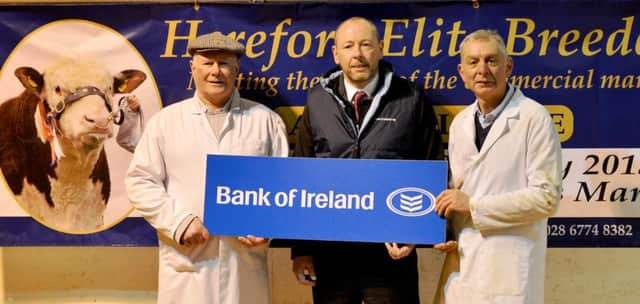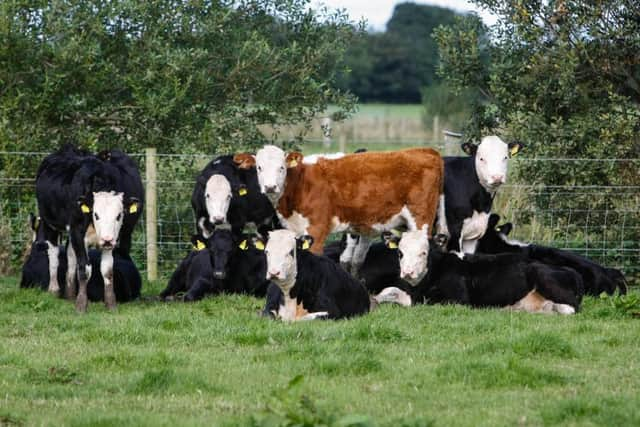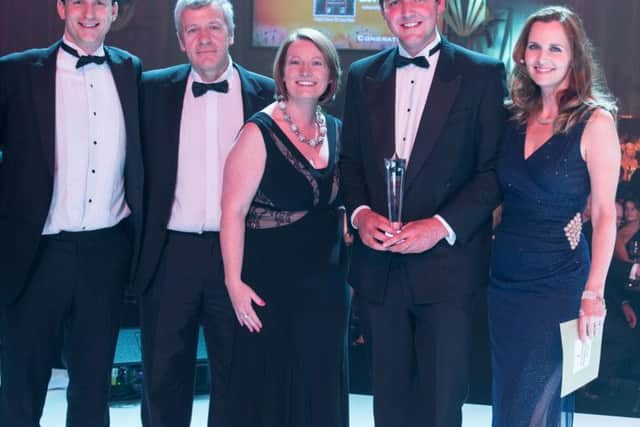Outstanding farmer award for Matthew


Matthew aged 24, who began a beef finishing and suckler enterprise in 2012, beat off competition from farmers across the UK to take the title.
Matthew introduced a Hereford bull to his breeding program over two years ago when Dunbia launched their Hereford beef scheme.
Advertisement
Advertisement
He also sourced Hereford calves through the Dunbia Dairy Calf to Beef Scheme which links the dairy and beef industries to create a short integrated supply chain which will provide a consistent and sustainable supply of quality beef.


“We run 100 suckler cows, largely Limousin-Aberdeen Angus crosses mainly sourced in the Irish Republic, and we are currently using one Hereford bull, one stabiliser and a Charolais.
“Based on our experience with Hereford bred cattle the future will see a lot more whiteheads grazing our fields,” said Matthew.
Aside from the home bred calves Matthew buys batches of 12 week old crossbred Hereford calves out of dairy cows from a specialist calf rearer– a cross he sees as having great potential in adding value to calves from dairy herds.
Advertisement
Advertisement
“We are looking to build on the Hereford influence – it is a premium brand, adding value to what we sell,” Matthew said.


By producing Hereford sired beef we enjoy an extra 35p a kilo over Northern Ireland base price.
“To be in- spec and gain the bonus cattle, steers or heifers, must be Farm Quality Assured, under 36 months, of UK origin and between 260 and 380kg,” explained Matthew, current Northern Ireland member of the Co-operative Hereford Scheme Committee.
“Aside from the price pull of the bonus that makes ‘Herefords – a cut above the rest, we appreciate the role of the breed in cutting production costs.
Advertisement
Advertisement
“Herefords suit our lowland farm in an ideal grass area with an average annual rainfall of over 35 inches.


“We find the Hereford a docile breed that does well at grass – and is a pleasure to work with when it comes to handling compared to some continental crosses.
“We weigh stock regularly to monitor performance and have been pleased to see very little difference in growth and carcass quality compared with the Charolais and Stabiliser crosses.
“Herefords thrive on a lower input, yet produce beef worth more per kilo.
Advertisement
Advertisement
“As regards grades Herefords out of dairy cows are usually an O or O+ with some Rs.


“Those from suckler cows are at least an R grade with a good smattering of Us.”
With a view towards a more closed suckler herd Matthew is considering also using Hereford sires to produce some replacement suckler cows carrying the breed’s strong maternal traits.
“As the herd has expanded improving cow fertility to reduce days – and output – lost has been a priority. The emphasis on producing beef efficiently at grass by using more Hereford genetics is also reflected in the grassland management at Brownlee Farms.
Advertisement
Advertisement
“They will have a major part to play in controlling our production costs and helping earn extra income thanks to having that unique brand appeal; an appeal that draws consumers willing to pay more at tills nationwide in good times and bad.”
Jim Dobson, Dunbia’s chief executive congratulated Matthew on his achievement: “Matthew is an exceptional young farmer who has changed the focus of the traditional family farm and turned it into a very successful beef enterprise in just three years and is now supplying Dunbia with over 650 prime cattle a year.
“He is extremely forward-thinking and progressive, constantly looking at ways to improve the profitability of his operation. He really is an outstanding farmer and I am delighted that he has been recognised nationally by The Co-operative Food.”